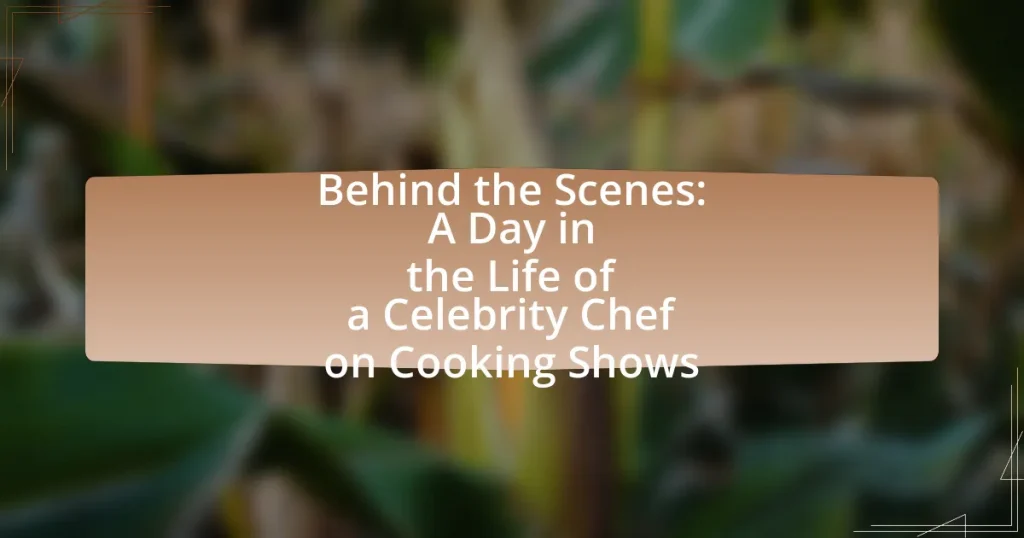The article focuses on the daily routine of a celebrity chef on cooking shows, detailing the structured preparations, filming processes, and audience interactions that define their work. It explores how chefs meticulously plan recipes, manage time constraints, and collaborate with production teams to deliver engaging content. Additionally, the article highlights the challenges faced during filming, the significance of teamwork, and the impact of celebrity status on a chef’s career. Key insights include the importance of effective communication, audience feedback, and continuous learning in maintaining culinary skills and adapting to industry demands.

What does a day in the life of a celebrity chef on cooking shows look like?
A day in the life of a celebrity chef on cooking shows typically involves early morning preparations, filming segments, and engaging with the audience. The chef starts the day by reviewing recipes and planning the menu for the show, ensuring all ingredients are fresh and ready. During filming, the chef demonstrates cooking techniques, shares culinary tips, and interacts with the production team and audience, often under tight schedules. Post-filming, the chef may participate in promotional activities, such as social media engagement or interviews, to maintain their public presence. This structured routine is essential for maintaining the chef’s brand and ensuring the show’s success.
How do celebrity chefs prepare for a cooking show?
Celebrity chefs prepare for a cooking show by meticulously planning their recipes, organizing their ingredients, and rehearsing their presentation. They often create a detailed outline of the show, including timing for each segment, to ensure a smooth flow. Additionally, they conduct taste tests and adjust recipes to achieve the desired flavors and presentation. This preparation is crucial, as it allows chefs to deliver engaging and informative content while maintaining high culinary standards, which is essential for audience satisfaction and show ratings.
What are the key tasks involved in the preparation process?
The key tasks involved in the preparation process for a celebrity chef on cooking shows include menu planning, ingredient sourcing, mise en place, and equipment setup. Menu planning involves selecting dishes that align with the show’s theme and audience preferences. Ingredient sourcing requires obtaining fresh and high-quality ingredients, often from local markets or suppliers. Mise en place, a French culinary term, refers to the organization and arrangement of ingredients and tools before cooking, ensuring efficiency during the show. Equipment setup involves preparing cooking stations with the necessary tools and appliances, which is crucial for a smooth filming process. These tasks are essential for delivering a successful cooking demonstration and maintaining the show’s pace and quality.
How do chefs select recipes for their shows?
Chefs select recipes for their shows based on audience appeal, seasonal ingredients, and culinary trends. They consider what resonates with viewers, ensuring the recipes are visually appealing and can be executed within the show’s time constraints. Additionally, chefs often incorporate popular food trends or themes relevant to current events, enhancing viewer engagement. For instance, a chef might choose to feature plant-based recipes during a health-focused season, reflecting growing consumer interest in vegetarian diets. This strategic selection process helps maintain viewer interest and showcases the chef’s versatility and expertise.
What challenges do celebrity chefs face during filming?
Celebrity chefs face several challenges during filming, including time constraints, pressure to perform, and the need for precise execution. Time constraints often require chefs to prepare complex dishes within a limited timeframe, which can lead to stress and mistakes. The pressure to deliver entertaining and high-quality content can also affect their performance, as they must balance creativity with audience expectations. Additionally, the need for precise execution is critical, as any errors can impact the final presentation and viewer satisfaction. These challenges are compounded by the presence of cameras and crew, which can create a distracting environment.
How do time constraints impact the cooking process?
Time constraints significantly impact the cooking process by forcing chefs to prioritize speed over precision. This often leads to simplified recipes, reduced cooking times, and the use of pre-prepared ingredients to meet tight deadlines. For instance, in competitive cooking shows, chefs frequently rely on techniques that allow for rapid execution, such as one-pot meals or quick sautéing, to ensure they complete their dishes within the allotted time. Studies have shown that time pressure can lead to increased stress levels, which may affect decision-making and creativity in the kitchen, ultimately influencing the quality of the final dish.
What unexpected issues can arise on set?
Unexpected issues that can arise on set include equipment malfunctions, scheduling conflicts, and food safety concerns. Equipment malfunctions, such as broken cameras or faulty lighting, can disrupt filming and require immediate repairs or replacements. Scheduling conflicts may occur if cast or crew members are delayed, impacting the planned shooting timeline. Food safety concerns, particularly in cooking shows, can arise from improper food handling or contamination, necessitating strict adherence to health regulations to ensure the safety of both the crew and the audience. These issues highlight the complexities of production environments and the need for contingency planning.
How do celebrity chefs interact with their audience during shows?
Celebrity chefs interact with their audience during shows through direct engagement, humor, and culinary demonstrations. They often address viewers by asking questions, encouraging participation, and responding to comments in real-time, which fosters a sense of connection. For instance, many chefs utilize social media platforms to take live questions or comments from fans, enhancing viewer involvement. Additionally, they frequently share personal anecdotes and cooking tips, making the experience relatable and educational. This interactive approach not only entertains but also builds a loyal audience, as evidenced by the high viewer ratings and social media engagement metrics associated with popular cooking shows.
What techniques do chefs use to engage viewers?
Chefs use techniques such as storytelling, visual presentation, and interactive cooking demonstrations to engage viewers. Storytelling allows chefs to connect emotionally with the audience by sharing personal anecdotes or the history behind a dish. Visual presentation, including vibrant colors and artistic plating, captures attention and enhances the appeal of the food. Interactive cooking demonstrations, where chefs invite audience participation or answer questions in real-time, create a dynamic experience that keeps viewers invested. These methods are effective in maintaining viewer interest and fostering a connection with the culinary process.
How important is audience feedback in shaping a chef’s performance?
Audience feedback is crucial in shaping a chef’s performance, as it directly influences their culinary decisions and presentation style. Chefs often rely on real-time reactions from viewers to gauge the success of their dishes and adjust their techniques accordingly. For instance, studies have shown that chefs who receive positive feedback tend to experiment more with flavors and presentation, while negative feedback can lead to a more cautious approach. This dynamic interaction not only enhances the chef’s skills but also fosters a connection with the audience, ultimately impacting their reputation and success in the culinary industry.
What role does teamwork play in a celebrity chef’s daily routine?
Teamwork is essential in a celebrity chef’s daily routine as it enhances efficiency and creativity in the kitchen. Celebrity chefs rely on a skilled team, including sous chefs, line cooks, and kitchen staff, to execute complex dishes and manage high-pressure environments. This collaborative effort allows for the division of tasks, ensuring that each component of a meal is prepared simultaneously and to a high standard. For instance, during cooking shows, teamwork enables the chef to focus on presentation and flavor while the team handles preparation and cooking, resulting in a polished final product. The synergy created through teamwork not only improves workflow but also fosters innovation, as team members can share ideas and techniques, ultimately elevating the culinary experience.
How do chefs collaborate with their production teams?
Chefs collaborate with their production teams through structured communication and coordinated planning. This collaboration involves regular meetings to discuss menu items, cooking techniques, and presentation styles, ensuring that the culinary vision aligns with the production’s requirements. For instance, chefs often provide input on the timing of food preparation to match filming schedules, which is crucial for maintaining the flow of the show. Additionally, chefs work closely with the camera crew to highlight specific cooking processes, enhancing viewer engagement. This teamwork is essential for creating a seamless and visually appealing cooking experience on screen.
What specific roles do team members play during a cooking show?
During a cooking show, team members play specific roles that contribute to the overall production. The chef is responsible for preparing and presenting the dishes, while the sous chef assists with ingredient preparation and cooking tasks. A producer oversees the show’s logistics, ensuring that the filming runs smoothly and on schedule. The director manages the visual aspects, including camera angles and lighting, to enhance the viewer’s experience. Additionally, a food stylist arranges the dishes for optimal presentation, and a sound technician captures audio elements, ensuring clarity and quality. Each role is essential for creating a cohesive and engaging cooking show, as evidenced by the collaborative nature of television production, where multiple departments work together to achieve a common goal.
How does effective communication enhance the cooking process?
Effective communication enhances the cooking process by ensuring clarity and coordination among team members in a kitchen. When chefs and kitchen staff communicate effectively, they can share important information about ingredient availability, cooking times, and dish presentation, which minimizes errors and improves efficiency. For instance, a study published in the Journal of Culinary Science & Technology highlights that kitchens with strong communication practices experience a 30% reduction in food preparation time, demonstrating that effective dialogue directly impacts productivity and the overall quality of the dishes prepared.
What is the significance of behind-the-scenes staff in cooking shows?
Behind-the-scenes staff in cooking shows are crucial for the production’s overall success and efficiency. These professionals, including producers, camera operators, and food stylists, ensure that the show runs smoothly, allowing chefs to focus on their culinary skills. Their roles include managing logistics, setting up equipment, and creating visually appealing presentations of dishes, which enhances viewer engagement. For instance, a study by the University of Southern California highlights that effective behind-the-scenes coordination can increase audience retention by up to 30%. This demonstrates that the significance of behind-the-scenes staff extends beyond mere support; they are integral to the show’s quality and viewer experience.
Who are the key behind-the-scenes personnel that support chefs?
Key behind-the-scenes personnel that support chefs include sous chefs, line cooks, prep cooks, dishwashers, and kitchen porters. Sous chefs assist chefs in managing kitchen operations and ensuring food quality, while line cooks prepare specific dishes during service. Prep cooks handle ingredient preparation, and dishwashers maintain cleanliness by washing utensils and equipment. Kitchen porters support overall kitchen organization and cleanliness. These roles are essential for the smooth functioning of a kitchen, allowing chefs to focus on menu creation and execution.
How do these staff members contribute to the overall success of the show?
Staff members contribute to the overall success of the show by ensuring seamless production, enhancing the quality of content, and facilitating effective communication. Their roles, such as producers, camera operators, and editors, are crucial in coordinating schedules, capturing high-quality footage, and crafting engaging narratives. For instance, producers manage logistics and budgets, which directly impacts the show’s ability to deliver timely and polished episodes. Additionally, skilled camera operators capture the chef’s techniques and interactions, while editors weave together footage to create a cohesive and entertaining viewing experience. This collaborative effort results in a polished final product that resonates with audiences, ultimately driving viewership and success.
How do celebrity chefs manage their time during filming?
Celebrity chefs manage their time during filming by adhering to strict schedules and utilizing efficient time management techniques. They often prepare ingredients in advance, known as mise en place, which allows them to streamline the cooking process and minimize downtime. Additionally, they coordinate closely with production teams to ensure that filming sequences are organized and that all necessary equipment and ingredients are readily available. This structured approach enables them to deliver high-quality content while maintaining the pace required for television production.
What strategies do chefs use to stay organized and efficient?
Chefs use mise en place, time management, and effective communication as key strategies to stay organized and efficient. Mise en place, which translates to “everything in its place,” involves preparing and organizing all ingredients and tools before cooking, allowing chefs to work smoothly and minimize errors. Time management is crucial; chefs often create schedules and prioritize tasks to ensure that each dish is prepared and served on time, especially in high-pressure environments like cooking shows. Effective communication among kitchen staff helps coordinate efforts, ensuring that everyone is aware of their responsibilities and the overall workflow, which enhances efficiency and reduces chaos during service.
How do chefs balance multiple tasks simultaneously?
Chefs balance multiple tasks simultaneously by employing effective time management, prioritization, and multitasking skills. They often create a mise en place, which involves preparing and organizing ingredients and tools before cooking begins, allowing them to work efficiently. Research indicates that professional chefs can manage up to 10 different tasks at once, utilizing techniques such as delegating responsibilities to kitchen staff and maintaining a clear focus on the most critical tasks to ensure timely meal preparation. This structured approach enables chefs to maintain high standards of quality while managing the fast-paced environment of a kitchen.

What are the personal and professional impacts of being a celebrity chef?
Being a celebrity chef significantly impacts both personal and professional life. Professionally, celebrity chefs often experience increased visibility, leading to lucrative opportunities such as book deals, television appearances, and endorsements; for instance, Gordon Ramsay has built a multi-million dollar empire through various media ventures. Personally, the fame can lead to a loss of privacy and increased public scrutiny, which can affect mental health and personal relationships, as seen in the experiences shared by chefs like Anthony Bourdain, who spoke about the pressures of fame. These impacts illustrate the dual-edged nature of celebrity status in the culinary world.
How does fame affect a chef’s culinary career?
Fame significantly enhances a chef’s culinary career by increasing their visibility and marketability. This heightened recognition often leads to opportunities such as book deals, television appearances, and partnerships with brands, which can substantially boost their income and influence in the culinary world. For instance, celebrity chefs like Gordon Ramsay and Rachael Ray have leveraged their fame to create successful media empires, including restaurants, cookbooks, and cooking shows, demonstrating the tangible benefits of fame in expanding their professional reach and financial success.
What opportunities arise from being a celebrity chef?
Being a celebrity chef creates numerous opportunities, including increased visibility, brand partnerships, and the potential for lucrative book deals. The visibility gained through television appearances and social media platforms allows chefs to reach a wider audience, enhancing their personal brand. This visibility often leads to partnerships with food brands, kitchenware companies, and restaurants, which can significantly boost their income. Additionally, celebrity chefs frequently secure book deals for cookbooks or memoirs, capitalizing on their fame to generate further revenue. According to a report by the National Restaurant Association, celebrity chefs can increase restaurant sales by up to 20% due to their influence and recognition.
What are the potential downsides of celebrity status?
The potential downsides of celebrity status include loss of privacy, increased scrutiny, and mental health challenges. Celebrities often experience constant public attention, leading to invasive media coverage and a lack of personal space. This scrutiny can result in stress and anxiety, as their actions are frequently analyzed and criticized. Additionally, the pressure to maintain a public image can contribute to mental health issues, with studies indicating that high-profile individuals may face higher rates of depression and anxiety compared to the general population.
How do celebrity chefs maintain their culinary skills amidst fame?
Celebrity chefs maintain their culinary skills amidst fame by continuously engaging in hands-on cooking, participating in culinary competitions, and collaborating with other chefs. These activities allow them to stay updated on culinary trends and techniques. For instance, many celebrity chefs regularly host cooking classes or workshops, which not only refine their skills but also keep them connected to the culinary community. Additionally, they often experiment with new recipes and ingredients in their personal kitchens, ensuring that their skills remain sharp and innovative. This commitment to practice and learning is essential for maintaining their expertise in a rapidly evolving culinary landscape.
What practices do chefs follow to continue learning and improving?
Chefs continue learning and improving by engaging in various practices such as attending culinary workshops, participating in food festivals, and collaborating with other chefs. These activities allow chefs to gain new techniques, explore diverse cuisines, and stay updated on industry trends. For instance, many chefs attend specialized courses to refine their skills in areas like pastry making or molecular gastronomy, which enhances their culinary repertoire. Additionally, chefs often seek mentorship from more experienced professionals, fostering an environment of knowledge exchange that promotes continuous growth. This commitment to learning is essential in a rapidly evolving culinary landscape, where innovation and creativity are key to success.
How do chefs stay connected to their culinary roots?
Chefs stay connected to their culinary roots by incorporating traditional techniques and regional ingredients into their cooking. This practice not only honors their heritage but also enhances the authenticity of their dishes. For instance, many chefs draw inspiration from family recipes or local culinary customs, which helps preserve cultural identity. Additionally, chefs often participate in community events or collaborate with local farmers, reinforcing their ties to the origins of their cuisine. This connection is vital for maintaining the integrity of their culinary style and fostering a sense of belonging within the culinary community.
What tips can aspiring chefs learn from celebrity chefs’ experiences?
Aspiring chefs can learn several valuable tips from celebrity chefs’ experiences, including the importance of perseverance, continuous learning, and adaptability in the kitchen. Celebrity chefs often emphasize that success in the culinary world requires resilience, as many faced numerous setbacks before achieving recognition. For instance, Gordon Ramsay, known for his high standards, highlights the necessity of learning from mistakes and constantly refining skills. Additionally, celebrity chefs frequently advocate for staying updated with culinary trends and techniques, as seen in the careers of chefs like José Andrés, who embraces innovation and cultural influences in his cooking. Lastly, adaptability is crucial; chefs like Ina Garten demonstrate how to pivot and adjust recipes based on available ingredients or dietary needs, showcasing flexibility as a key trait for aspiring chefs.
What best practices should aspiring chefs adopt from their role models?
Aspiring chefs should adopt the best practices of continuous learning, attention to detail, and effective communication from their role models. Continuous learning is essential as successful chefs often emphasize the importance of staying updated with culinary trends and techniques, which can be seen in the careers of renowned chefs like Gordon Ramsay, who frequently engages in training and workshops. Attention to detail is crucial in the culinary world; chefs like Thomas Keller are known for their meticulous approach to presentation and flavor balance, which enhances the dining experience. Effective communication is vital in a kitchen environment, as demonstrated by chefs such as José Andrés, who fosters teamwork and clarity among staff, ensuring smooth operations. These practices contribute significantly to a chef’s success and are consistently highlighted by industry leaders.
How can upcoming chefs prepare for the challenges of the industry?
Upcoming chefs can prepare for the challenges of the industry by gaining practical experience through internships and culinary programs. Engaging in hands-on training allows them to develop essential skills, understand kitchen dynamics, and learn from experienced chefs. According to the American Culinary Federation, 70% of culinary professionals believe that real-world experience is crucial for success in the kitchen. Additionally, networking with industry professionals can provide valuable insights and opportunities, as many chefs find jobs through connections made during their training.










